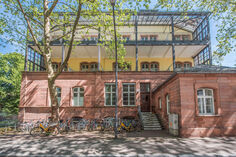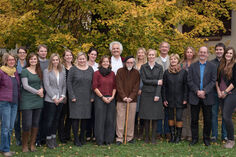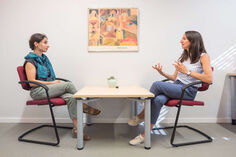Psychosocial Aspects about Digital Medicine
News
VERIKOM project presentation at the 72nd Lindau Nobel Laureate Meeting 2023.
On June 30, 2023, the closing event of the 72nd Lindau Nobel Laureate Meeting organized by the state of Baden-Württemberg took place in Lindau. Our research team of the VERIKOM project was invited to present the project and the first findings in the context of the research exhibition on Digital Health/KI in Medicine. The research exhibition took place on a boat trip from Lindau to Mainau Island. We are happy about the many stimulating discussions and thankful for the invitation!
VERIKOM
Responsible artificial intelligence (AI) in doctor-patient communication.
In the planned project, we are investigating how physicians and patients react to different digitized and AI-mediated communication formats in realistic eHealth scenarios in order to filter out which formats can actually be used responsibly in physician-patient interaction for the benefit of patients.
To pilot the experiment, an online survey of a representative sample of the German population is planned in order to obtain indications of the acceptance and willingness to use digital doctor-patient interactions through to the use of artificial intelligence in doctor-patient communication.
Thereupon, interaction sequences for doctor-patient communication are designed, which contain varying degrees of AI (benefit of a Wizard of Oz design) and these are compared with real social communication in a doctor-patient interaction. The interaction sequences describe different diagnostic situations and treatment planning under standard conditions, but also under aggravating circumstances (including serious diagnosis, anxiety reaction, or expression of suicidal thoughts by the patient*s). The response of the practitioners and the patients* will be documented on several levels (self-report, standardized survey on psychobiological measures and video coding) and the different sequences will be compared.
From the findings, we plan to derive recommendations for the use of AI-based techniques in healthcare that take into account psychological aspects of patients* in particularly sensitive situations.
Partners:
Steffen Walter and Daniela Geisel, Ulm University Hospital.
Genetic counseling between AI and personal decision-making
According to the law on human genetic testing in Germany, genetic counseling is offered by physicians to accompany every genetic diagnostic test. The complexity of this counseling is increasing significantly due to the introduction of algorithms and artificial intelligence (AI) in diagnostics. It is a challenge for the medical staff to deal comprehensively with the examination result, its meaning and consequences on the one hand, and the algorithms and AI methods used as well as human genetic basics on the other hand.
For this reason, the project aims to create educational videos to be shown to patients prior to their genetic diagnostic doctor-patient consultation. In this way, more space is to be created for individual topics and risk communication during the consultation.
First, focus groups with affected patient groups and physicians involved in genetic counseling will be conducted to investigate the specific content needs as well as structural aspects of the educational videos using a qualitative content analysis. Based on these results, the videos will be created, which will then be evaluated and quantitatively analyzed in an experimental design within real genetic counseling sessions.
We see the design of the film sequences and the evaluation of the videos in real counseling sessions as having a direct benefit for the care, because the digital pre-information of the patients* leaves more time for individual and emotionally stressful topics as well as interactive risk communication in the personal conversation. After completion of the project, the videos will be made available free of charge to other clinics and human genetics practices.
Partners:
Christian Schaaf and Sebastian Sailer, Institute of Human Genetics at Heidelberg University Hospital.
Hannah Wallaschek and Johanna Tecklenburg, Institute of Human Genetics at the Hannover Medical School



